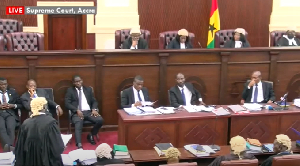Opinions of Tuesday, 21 February 2023
Columnist: WAL.COM
The level of corruption in Ghana's politics
Ghana's political system is characterized by a multi-party democracy, with regular elections and a constitution that enshrines principles of transparency and accountability.
Despite these principles, corruption has become entrenched in the country's politics, with various public officials and politicians accused of using their positions to enrich themselves at the expense of the general public.
One of the main causes of corruption in Ghana's politics is the lack of effective oversight and enforcement mechanisms. Many of the country's institutions responsible for investigating and prosecuting corruption cases are under-resourced, and corrupt officials often use their influence to evade punishment.
Another factor contributing to corruption in Ghana is the lack of transparency in the country's political system. Many public officials and politicians are not required to disclose their assets, making it difficult to track their financial dealings and identify any conflicts of interest.
Furthermore, the culture of impunity in Ghanaian politics has allowed corrupt officials to act without fear of consequences. Despite numerous corruption scandals and accusations, very few politicians and public officials have been held accountable for their actions.
Corruption in Ghana has serious consequences for the country's development and its citizens. The diversion of public funds and resources to private pockets undermines the country's economic growth and development. It also perpetuates poverty and inequality by depriving ordinary Ghanaians of basic services and opportunities.
To address corruption in Ghana's politics, there is a need for a concerted effort by the government, civil society, and the general public. Strengthening the institutions responsible for investigating and prosecuting corruption cases, and ensuring they are well-resourced and independent, is critical.
The government must also prioritize the establishment of transparency mechanisms, such as asset declaration requirements and public access to information. This will enable citizens to hold their leaders accountable and reduce opportunities for corrupt practices.
Finally, there is a need for a change in the culture of impunity in Ghanaian politics. Politicians and public officials must be held accountable for their actions, regardless of their positions or connections. The establishment of an independent anti-corruption commission could play a crucial role in this regard.
In conclusion, corruption is a significant issue in Ghana's politics, with numerous politicians and public officials accused of engaging in corrupt practices. To address this issue, there is a need for a concerted effort by the government, civil society, and the general public to strengthen institutions responsible for investigating and prosecuting corruption cases, establish transparency mechanisms, and end the culture of impunity in Ghanaian politics. Only then can Ghana achieve its full potential as a prosperous and equitable society.













